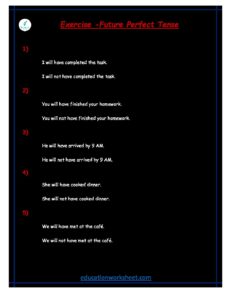changing Future Perfect Tense to negative and positive
changing Future Perfect Tense to negative and positive
The Future Perfect Tense is a grammatical construct used in the English language to describe actions or events that will be completed at a specific point in the future. It is formed by combining the future auxiliary verb “will have” with the base form of the main verb, followed by the past participle. In this article, we will explore the formation and usage of the Future Perfect Tense, both in its positive and negative forms.
Positive Future Perfect Tense

The positive form of the Future Perfect Tense is used to express actions or events that will be completed or finished by a particular point in the future. This construction is created by using the auxiliary verb “will have” followed by the base form of the main verb and the past participle.
Formation:
Subject + will have + past participle
For example:
- I will have completed my project by next week.
- They will have graduated by the time we visit them.
- She will have written her novel before the end of the year.
In these examples, the positive Future Perfect Tense indicates that the actions (completing a project, graduating, writing a novel) will be finished in the future, and the speaker is confident about this completion.
Negative Future Perfect Tense

The negative form of the Future Perfect Tense is used to express that an action or event will not be completed by a specific point in the future. This is constructed by adding “not” after “will” and before “have,” followed by the base form of the main verb and the past participle.
Formation:
Subject + will not (won’t) have + past participle
For example:
- I won’t have finished my book by the end of the month.
- They won’t have repaired the car before our trip.
- She won’t have cooked dinner when we arrive home.
In these examples, the negative Future Perfect Tense conveys that the actions (finishing a book, repairing a car, cooking dinner) will not be completed in the future, and the speaker is certain about the non-completion of these actions.
Usage of the Future Perfect Tense

- Completion of Future Actions: The positive Future Perfect Tense is used when you want to express that a specific action or event will be completed or finished by a particular point in the future. This tense is ideal for talking about future achievements or accomplishments.
- By the time I retire, I will have traveled to every continent.
- They will have built their dream house by next year.
- Prediction of Future Actions: While it is not often used in this context, the Future Perfect Tense can be used to predict that a future action will be completed or not completed. This usage is less common compared to other future tenses.
- She will have found a new job by the end of the year.
- He won’t have fixed the computer by the time we need it.
- Referring to a Specific Point in the Future: The Future Perfect Tense is often used when there is a specific time or date in the future by which you want to refer to the completion of an action. It provides a sense of definiteness about the timing of the event.
- I will have graduated from college by 2025.
- They will have celebrated their 50th wedding anniversary by the end of the month.
- Expressing Uncertainty in Negative Form: The negative Future Perfect Tense is used to express certainty that an action will not be completed by a certain point in the future. It is a way to make clear that the completion of the action is not expected or will not happen.
- I won’t have saved enough money for the trip by next summer.
- They won’t have fixed the roof before the rainy season starts.
- Hypothetical Situations: The Future Perfect Tense, especially in the negative form, can be used to discuss hypothetical situations or unrealized future outcomes. It can convey a sense of regret or unrealized potential.
- If I had studied harder, I would have graduated with honors.
- If they had invested wisely, they wouldn’t be struggling financially now.
In summary, the Future Perfect Tense is a versatile tense that allows speakers and writers to convey the completion or non-completion of actions or events at specific points in the future. The positive form is used to express confidence in the completion of an action, while the negative form asserts the non-completion of the action. By understanding and using both forms effectively, you can communicate with precision when discussing future events and their outcomes.

